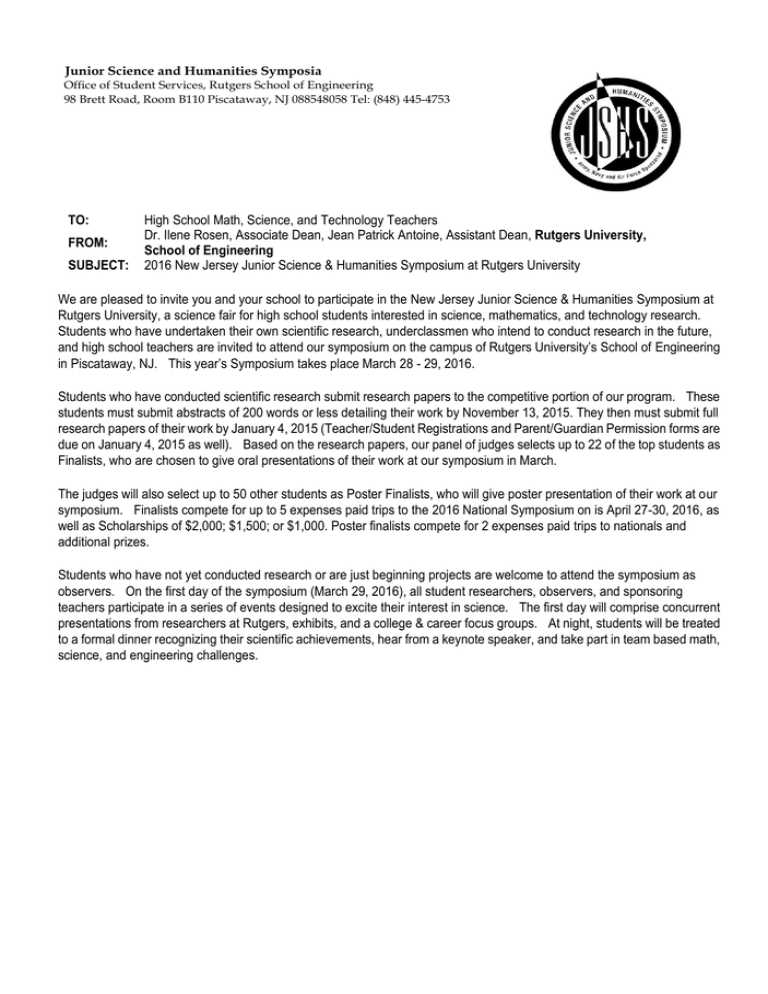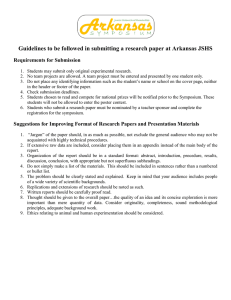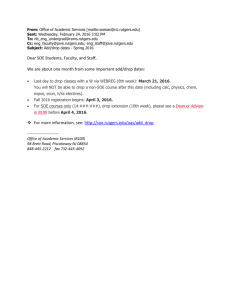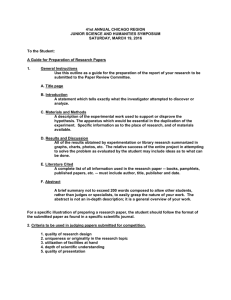Invitation and Guidelines - Rutgers University School of Engineering
advertisement

Junior Science and Humanities Symposia Office of Student Services, Rutgers School of Engineering 98 Brett Road, Room B110 Piscataway, NJ 088548058 Tel: (848) 445-4753 TO: FROM: SUBJECT: High School Math, Science, and Technology Teachers Dr. Ilene Rosen, Associate Dean, Jean Patrick Antoine, Assistant Dean, Rutgers University, School of Engineering 2016 New Jersey Junior Science & Humanities Symposium at Rutgers University We are pleased to invite you and your school to participate in the New Jersey Junior Science & Humanities Symposium at Rutgers University, a science fair for high school students interested in science, mathematics, and technology research. Students who have undertaken their own scientific research, underclassmen who intend to conduct research in the future, and high school teachers are invited to attend our symposium on the campus of Rutgers University’s School of Engineering in Piscataway, NJ. This year’s Symposium takes place March 28 - 29, 2016. Students who have conducted scientific research submit research papers to the competitive portion of our program. These students must submit abstracts of 200 words or less detailing their work by November 13, 2015. They then must submit full research papers of their work by January 4, 2015 (Teacher/Student Registrations and Parent/Guardian Permission forms are due on January 4, 2015 as well). Based on the research papers, our panel of judges selects up to 22 of the top students as Finalists, who are chosen to give oral presentations of their work at our symposium in March. The judges will also select up to 50 other students as Poster Finalists, who will give poster presentation of their work at our symposium. Finalists compete for up to 5 expenses paid trips to the 2016 National Symposium on is April 27-30, 2016, as well as Scholarships of $2,000; $1,500; or $1,000. Poster finalists compete for 2 expenses paid trips to nationals and additional prizes. Students who have not yet conducted research or are just beginning projects are welcome to attend the symposium as observers. On the first day of the symposium (March 29, 2016), all student researchers, observers, and sponsoring teachers participate in a series of events designed to excite their interest in science. The first day will comprise concurrent presentations from researchers at Rutgers, exhibits, and a college & career focus groups. At night, students will be treated to a formal dinner recognizing their scientific achievements, hear from a keynote speaker, and take part in team based math, science, and engineering challenges. WHO IS ELIGIBLE?: Any student attending a high school in Northern or Central New Jersey is eligible to participate. Students in the southern half of New Jersey instead participate in the Monmouth JSHS (http://www.monmouth.edu/academics/junior_science_symposium/default.asp). There is no registration fee to participate; all program costs and meals during the symposium are covered for up to 5 students (as observers/presenter), and up to 1 chaperone per school. Additional observers are allowed but will have to contact Jean Patrick Antoine by emailing j.antoine@rutgers.edu. PROGRAM OBJECTIVES: The primary aims of JSHS are to promote research and experimentation in the sciences, engineering, and mathematics at the high school level, and to publicly recognize students for outstanding achievement. At the Symposium, students are able to meet similarly dedicated and enthusiastic students from other schools, learn about future careers in science and engineering, and to be inspired by other students’ research. AWARDS: Students participating in our “Oral Competition” are competing for a) three expenses paid trips to the National JSHS. b) three scholarships ranging from $1,000 to $2,000 c) three opportunities to present their work at Nationals, competing for up to $16,000 in scholarship money. d) additional prizes such as t-shirts, books, etc. Students participating in our “Poster Competition” are competing for a) two expenses paid trip to the National JSHS. b) additional prizes such as t-shirts, books, etc. Steps to Participation: STEP 1: HOW DO I REGISTER?: Teachers who will be chaperoning their students should submit the School Registration Form by November 13, 2015. Please fill-out the online registration form: http://soe.rutgers.edu/jshs/Registration Students who would like to register for the symposium independently (i.e. no other students from their school plan to attend, and they will be chaperoned by a parent rather than a teacher) should also submit the online School Registration Form. Along with the online School Registration Form, all students who will be submitting their research for the competitive portion of our program must submit an Abstract of 200 words or less describing their research, via the following website: http://soe.rutgers.edu/jshs/studentAbstract The deadline for submitting abstracts is also November 13, 2015. STEP 2: HOW DO I SUBMIT RESEARCH PAPERS?: Students who wish for their research to be considered for the competitive portion of our program must submit full research papers describing their work by January 4, 2016. All papers should be submitted in .pdf format to the following email address: nnj.jshs.rutgers@gmail.com. The format and guidelines for research papers are available at http://soe.rutgers.edu/jshs under the forms section. Our judges will read these papers and choose the best papers to compete in the “Oral Competition” at our Symposium. The authors of all papers that demonstrate excellent work and understanding but are not selected for the “Oral Competition” will be invited for our “Poster Competition.” Students whose work does not meet the standard for selection will still be eligible to attend the Symposium as an observer. Our judges’ decisions will be posted to http://soe.rutgers.edu/jshs on February 22, 2016. STEP 3: HOW DO I SUBMIT PERMISSION FORMS?: All students who will be attending the Symposium (either as a research presenter or observer) must submit permission forms, also by January 4, 2015. http://soe.rutgers.edu/files/2016ParentGuardianPermissionForm.pdf http://soe.rutgers.edu/files/2016PrincipalScienceChairForm.pdf How to submit materials to Rutgers: (ALL MATERIALS MUST BE SUBMITTED BY THE CHAPERONE) All materials may be sent via electronic mail. Electronic Mail: For the submission of signed forms, and papers, please use nnj.jshs.rutgers@gmail.com. We require that full research papers be submitted in PDF format. Microsoft Word (“.doc”) files are not permitted since the formatting of the paper on one computer often does not match the formatting of the paper on other computers. To turn a Microsoft Word file into a PDF file, you can use Adobe Acrobat (which costs money), or programs such as PDFCreator ( http://sourceforge.net/projects/pdfcreator/ ), which is free. Most of these programs are installed as if they were printers attached to your computer. You must keep file sizes small ( < 10 megabytes) when submitting materials via email. Event Logistics: For the Symposium itself on March 28 and 29, 2016, please plan to arrive at Rutgers University’s Busch Campus Center in Piscataway, NJ by 10:00 AM on March 28, 2016. The event will conclude no later than 6:00 PM on March 29, 2016. Attendees are responsible for their own transportation to and from the event. QUESTIONS? If you have any questions about the JSHS program, please feel free to contact JSHS Assistant Director: Mr. Jean Patrick Antoine, j.antoine@rutgers.edu 848-445-4753 ** IMPORTANT DATES AND DEADLINES ** School/Teacher/Student Registrations are due November 13, 2015. Student Abstracts are due November 13, 2015. Student Full Papers are due January 4, 2016. Parent/Guardian Permission forms are due January 4, 2016. Principal/Chairperson of Science Department forms are due January 4, 2016. Judges results will be announced on February 22, 2016. Northern New Jersey Junior Science and Humanities Symposium will be on March 28 - 29, 2016. SPONSORSHIP: The Junior Science & Humanities Symposium has been sponsored by the United States Department of the Army since its inception in 1958, and additionally sponsored by the Departments of the Navy and Air Force since 1995 and 1996, respectively. Resulting from this sponsorship and the cooperative efforts of universities throughout the nation, JSHS annually reaches over 10,000 high school students and teachers at regional and national symposia. The Academy of Applied Science, a nonprofit organization in Concord, New Hampshire, administers the National JSHS Program in cooperation with universities and other educational institutions. National Website: http://www.jshs.org Abstract Guidelines The abstract should provide a concise yet descriptive overview of your research project in no more than 200 words. A good abstract briefly states the research problem or purpose of the research, how the problem was studied, what was found, and what the findings mean (conclusions). A properly written abstract presents a summary of the research conducted and the most significant conclusions reached. No pictures, charts, graphs or attachments may accompany the abstract. Format for the 200-word abstract: The header preceding the abstract body must include: 1. Title of the research; 2. Name(s) of Author(s); 3. High school, high school city, high school state; 4. Name of teacher/mentor/sponsor. Precede the individual's name with a subheading (i.e. teacher, mentor, sponsor); 5. Include one line of space between the heading and the abstract body. (taken from http://www.jshs.org/Abstract_Submission.html) Writing the Body of the Abstract Abstracts are the chief means by which scientists decide which research reports to read. The abstract is a very brief overview of your ENTIRE research project. The abstract tells the reader WHAT you did, WHY you did it, WHAT you found and WHAT it means. The sequence of sentences is ordered in a logical fashion, beginning with an introduction that includes your hypothesis and proceeding to your test (e.g. materials, methods and procedures used), results (data or findings), discussion and conclusions. Distill the most important items of your research project, and leave out unimportant details. As a first draft, write one or two sentences that summarize each section. For your final draft, make sure the abstract flows logically. Give it to a friend, teacher, parent, mentor, etc., to read. Ask them to tell you what they think you actually did and what you found. Revise as necessary. Research Paper Guidelines A. Preparation of Student Research Papers 1. General -All papers must be prepared according to the following: a. Be typed, double-spaced, one side only, on 8½” by 11” paper with one-inch margins. b. The paper should be a minimum of 5-6 pages and a maximum of 20 pages, including appendices. When submitting electronically, be sure that the paper is in PDF format. Include only 1 copy if submitting by postal mail. c. Cite all references, sources of information, and include a bibliography. d. Include a Title Page that includes the Student’s Name, Title of Paper, and High School. e. Include a page detailing any major assistance received, as well as an acknowledgement of your research mentors. This should come directly after your title page. f. Use your paper’s title as a header on all pages. Do not put your name on these pages. 2. Paper Content – we suggest organizing the paper as follows: a. Abstract – concise descriptive overview of paper *Follow Abstract guideline on http://soe.rutgers.edu/jshs* b. Introduction -a clear and concise statement of the purpose or objective. c. Procedure/Materials and Methods -described in sufficient detail to permit a reviewer or listener to understand how the results or data were obtained. d. Results -stated clearly and concisely. This section should state what you observed (facts). Analysis of these results is left to the following section. e. Discussion and Conclusions -stated clearly and concisely, and based upon the material presented in the results section. f. Related Work – If appropriate, a student may wish to describe work done by other researchers on similar problems and topics. g. Future Work -Plans and directions for continued research may also be included. h. Literature Cited-We suggest using in-line citations i.e. [3] throughout the paper. These numbers correspond to literature (research papers or books) cited in this final section. While this method of organization is flexible, we recommend that it be followed as is appropriate to your research. For instance, research which creates a novel design for a system should spend more time detailing and evaluating design decisions. Overall, clarity and a logical argument should be your overriding goals. 3. Preparation of Illustrations a. Art work and illustrations must be of high quality, neat, and legible. b. All diagrams and illustrations will be clearly referenced in the research paper (e.g., Fig. 2, etc.) and should include descriptive captions describing what is shown.



